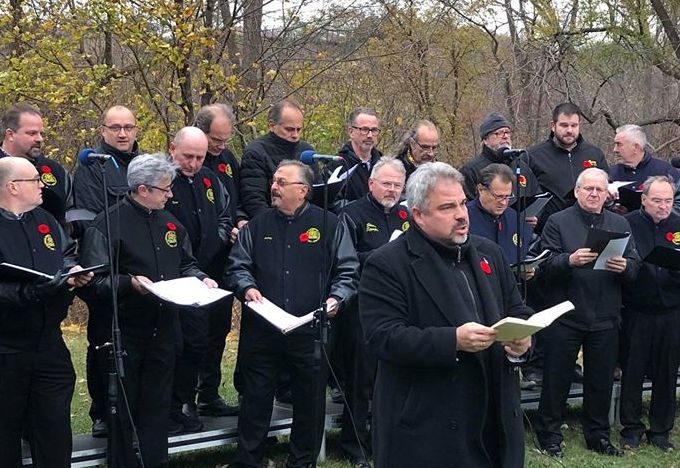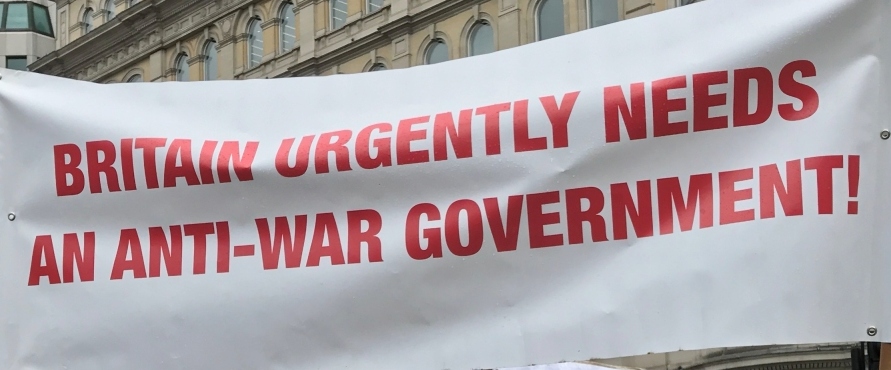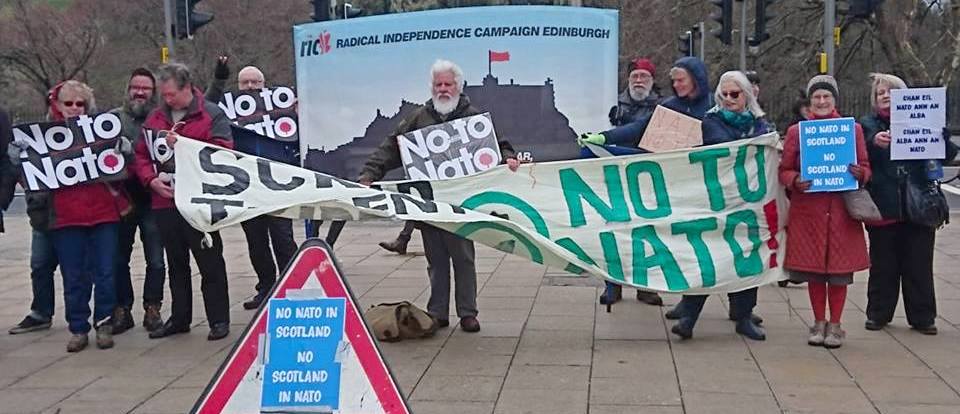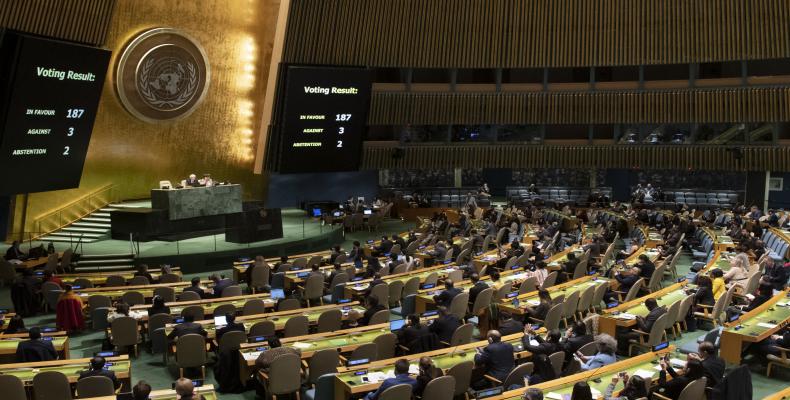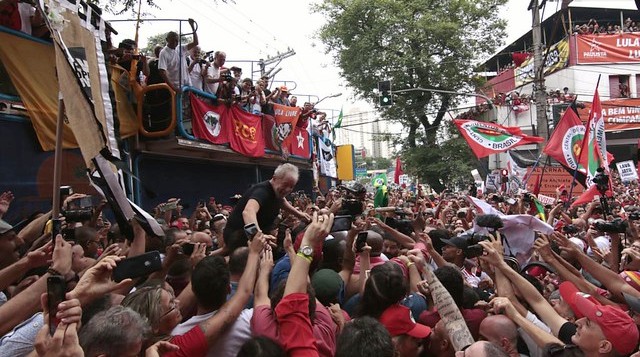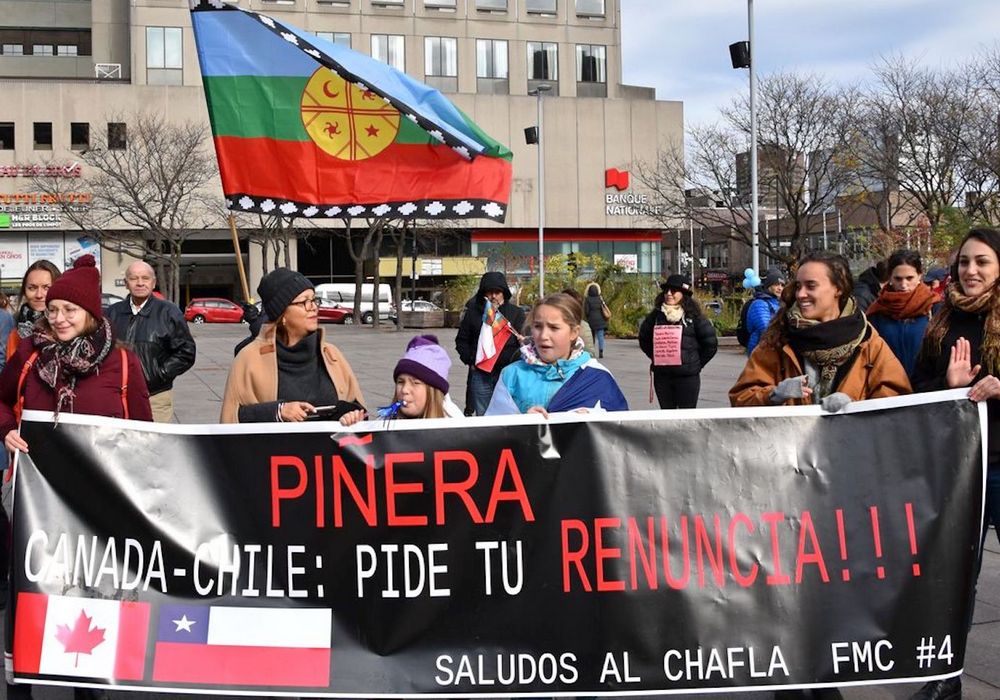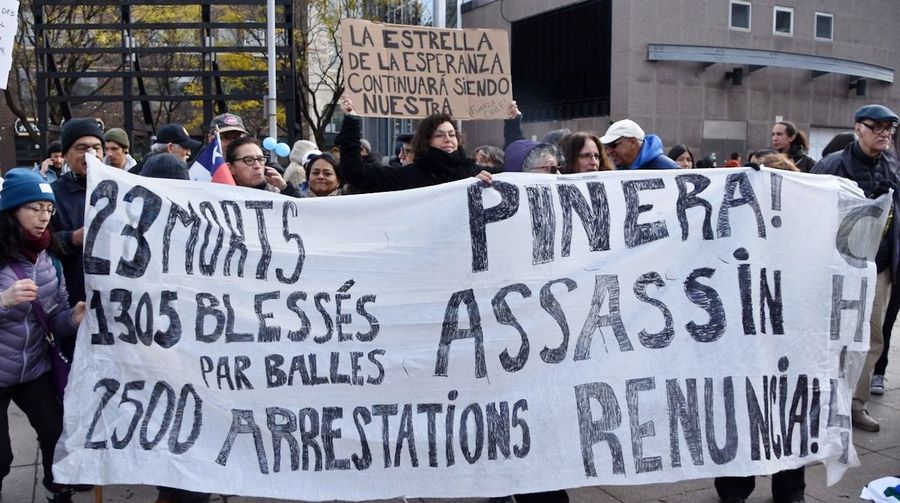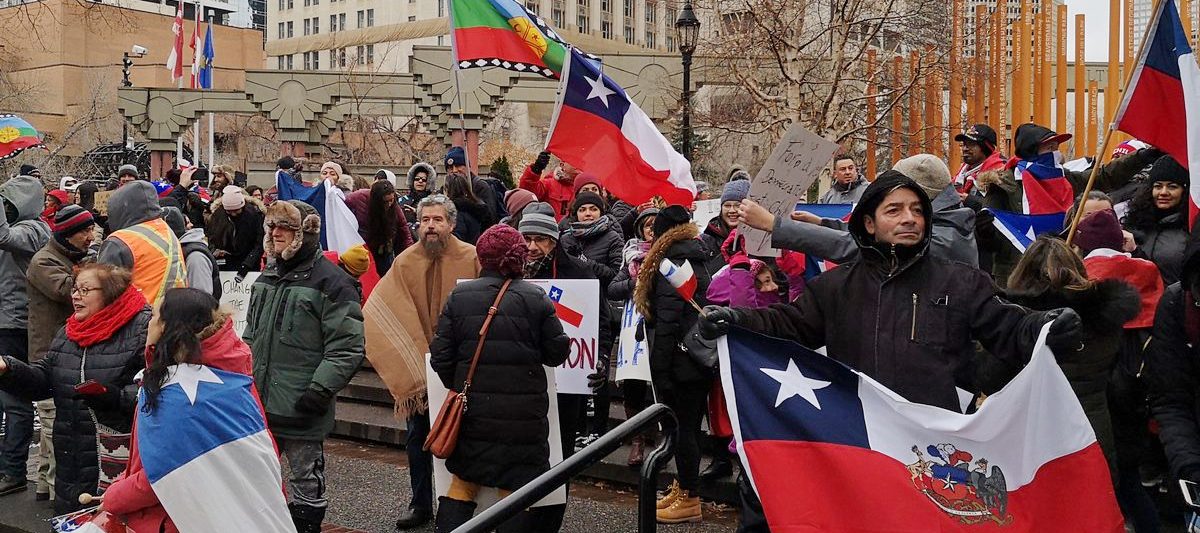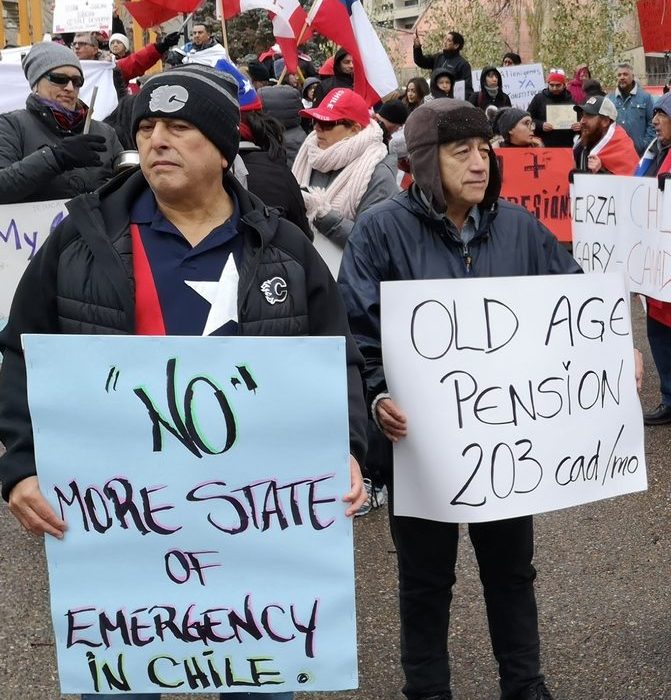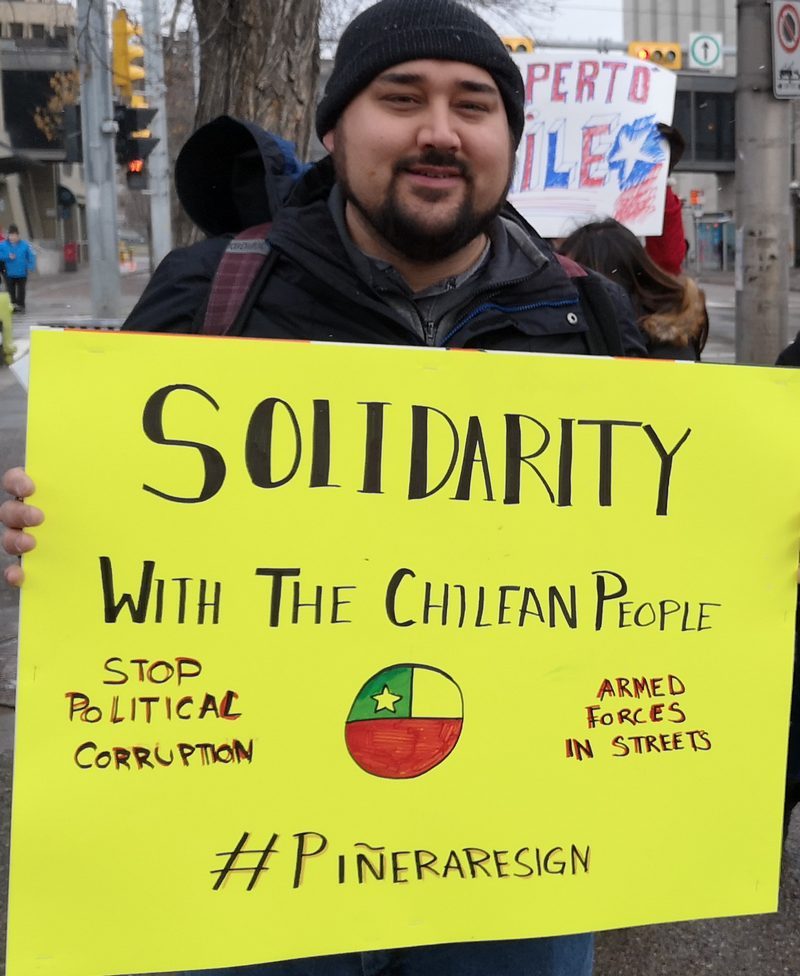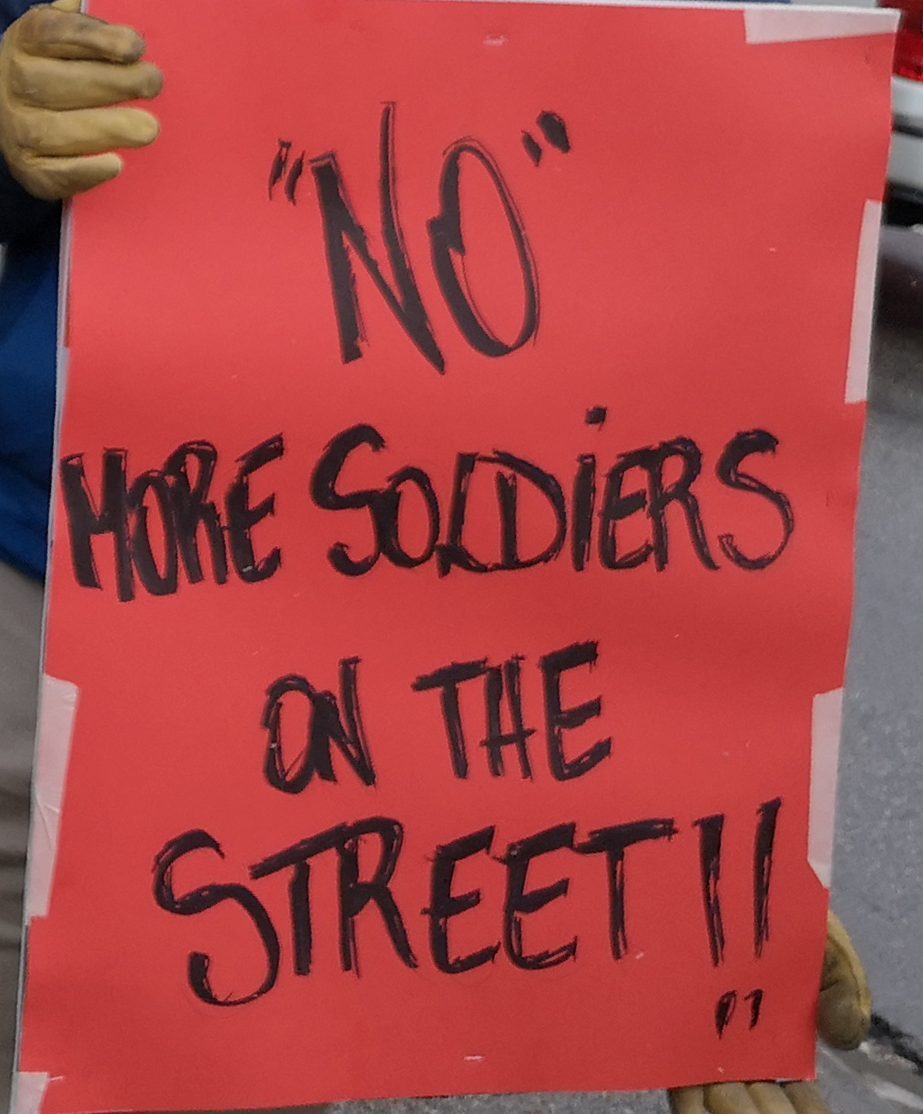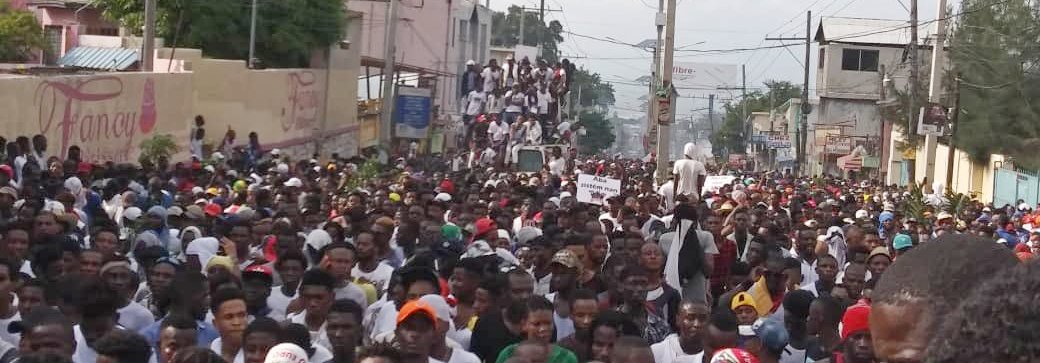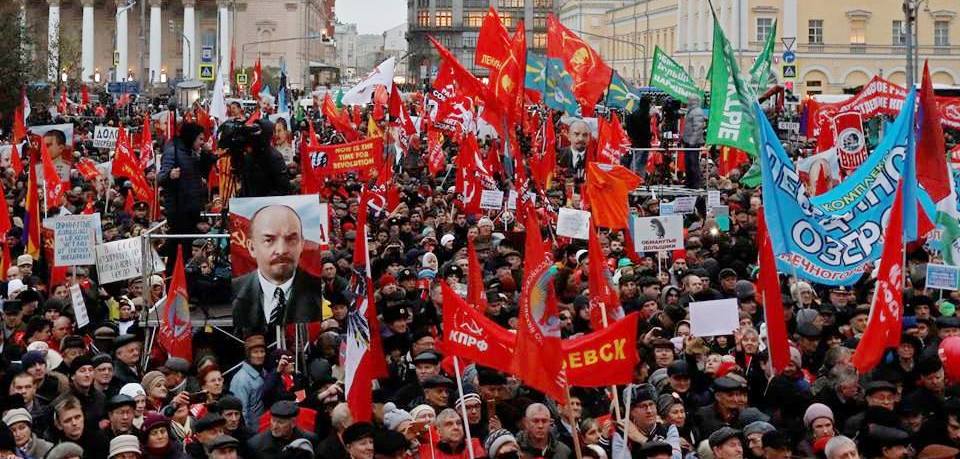
|
November 10, 2019 - No. 26 All Out
to Oppose the Halifax
Anniversary of the Armistice Signed to End World War I • Make
Canada a Zone for Peace! - Tony Seed -
• Working People Give Voice to Their Own Agenda - Stop the War Coalition Statement -
• Resounding
Rejection at the United Nations of • Celebration
in
Ottawa of Cuban National Culture Day
• Denounce
Foreign-Inspired
Coup d'État in Bolivia
• Militant
Actions Support Chilean People and Demand
• Collective
Text of 40 Organizations • Statement
Issued by Quebec City Area Organizations 213th Anniversary of
the Assassination of • Communiqué on the Situation in Haiti - Latin American Council of Social Sciences (CLACSO) -
• Protest Reaches Boiling Point - Emile
Schepers -
• Historic
Parade in Moscow Supplement • Havana
Anti-Imperialist Solidarity Conference, • The
Cuban Revolution at 60 -- No Harbour for War All Out to Oppose the Halifax War Conference!The U.S.-based Halifax International Security Forum (HISF), known to the anti-war movement as the Halifax War Conference, returns to that city for the 11th year in a row from November 22 to 24. The notion of security promoted by the HISF is intrinsically linked to NATO and its aggressive agenda and demands for Canada to increase its military spending by tens of billions of dollars. It is also part of further integrating Canada into U.S. Homeland Security, putting its people, lands, seas and harbours at the disposal of U.S. imperialist aims. It is linked to NATO's political apparatus, the Atlantic Council (and its Canadian chapter the NATO Association of Canada), which is pushing an agenda that opposition to NATO constitutes "foreign interference" in Canada's affairs.
Some 300 participants from 90 countries are expected to take part in this war conference. In an October 24 press release, HISF President Peter Van Praagh stated that this year's conference will "highlight the need for a coordinated strategic response among democratic allies to the challenge posed by China, the increasingly urgent problem of climate change, the security of our democratic systems from foreign interference, international law and order, inclusive security, and how the world is responding to American leadership." The press release indicates that the HISF is considered a platform where the U.S. will issue its dictate, "As is customary, the conference features a delegation from the United States Congress, as well as leaders in the United States military and wider security community. Internationally, joining them from more than 75 countries are ministers, experts, chiefs of defense staff, and top media personalities." What working people consider foreign interference is the concept of security promoted by the HISF that comes from U.S. and NATO warmongers, and is not based on their own demands. Working people want the security that comes from being able to exercise control over the economy, their working conditions and all the matters that affect their lives, the youth desire the security of a bright future, seniors want security and dignity in retirement, and women, the Indigenous peoples and others are fighting for the security that comes from the recognition of rights which belong to us by virtue of being human. Nor does the HISF reflect the desire of Haligonians for friendly relations with other countries, as epitomized by the recent conference hosted by the city, "The Cuban Revolution at 60" that highlighted Nova Scotia's friendship with Cuba for over 100 years.
Anniversary of the Armistice
Signed to
End
World War I Make Canada a Zone for Peace!On November 11, 1918, the Armistice which brought World War I to an end was signed, marking the end of the war. A slaughterhouse of unprecedented proportions, World War I was referred to as the "war to end all wars." Despite this, it is well known that the subsequent peace treaty signed in Versailles, was a factor in laying the grounds for the growth of fascism and World War II.
The war also marked a turning point in history. In 1917, the Russian working class and people organized the Great October Socialist Revolution and took Russia out of the war. When
Soviet power was established, Winston Churchill called for the
crushing of the baby "in the cradle." In the aftermath of the war,
fourteen foreign powers, including Canada, militarily
intervened
in order to foment civil war, seize Soviet Russia's assets for
themselves and put an end to the revolution and Soviet power. But
Soviet power prevailed and they were defeated. Far from being
crushed, the Great October Socialist Revolution led to the
advance of society, to its vigorous development and the
unprecedented release of human initiative. Drastic political, cultural, economic, and social change occurred in Europe, Asia and Africa, even in areas outside those directly involved. Four empires collapsed due to the war -- the Russian Czarist Empire, the Ottoman Empire, the German Empire and the Austro-Hungarian Empire. Old countries were abolished, new ones were formed and boundaries were redrawn. International organizations, such as the League of Nations, were established. Soviet Russia was industrialized at a record rate, a phenomenon unheard of up till that time. It provided the example of a triumphant march. No matter what enemy it faced, it knew no defeat. The high ideals of a "War to End All Wars," of
duty to
King and Country, to empire, were shown to be a cover, a false
justification, for the horrendous clash of the imperialist warmongers.
Yet these same values are promoted at this time, under the rubric "Lest
we forget" -- the dead are the glorious ones, because they made the
supreme sacrifice for freedom against a heinous enemy.
|
|
|
The OUN not only pledged its allegiance to Hitler but itself committed countless war crimes. Konovalets is still idolized by the UWVA, as evidenced by a religious meeting held on May 26, 2019 at St. Andrew's Ukrainian Orthodox Church in Toronto, "to honour the memory of two great men:" Symon Petliura -- head of the Ukrainian People's Republic (UPR) (1918-1921), who is widely known for organizing pogroms and massacres of the Jewish population of the UPR and was shot in Paris in 1926 -- and Konovalets. According to its website, "The UWVA of Canada accepted the responsibility for continued maintenance and care of Col. Konovalets' grave site in Rotterdam, and proudly continues to do so to this very day."
In Canada, the UWVA evolved into the Ukrainian National Federation (UNF) formed in 1932. Kossar, its leader, was listed as a person to be arrested and interned at the outbreak of World War II. Instead, the government of Mackenzie King intervened to create a new organization, the Ukrainian Canadian Committee, in which all the anti-communist organizations were expected to unite as part of smashing indigenous mass communist and progressive organizations. Two of the founding factions were explicitly pro-German -- the UNF and the United Hetmen Organization -- and inculcated with the fight against "Jewish Bolshevism.” This new organization was apparently based on a quid-pro-quo arrangement -- get behind the war effort, and in return the Canadian government would support their “cause” in post-war peace negotiations. This cause was their demand that they be installed as the leaders of an autonomous Ukraine -- similar to the one at the end of World War I -- following the hoped-for dismemberment of the Soviet Union. Kossar was amongst those summoned to Winnipeg by the government in November 1940 to participate as a founding member in the creation of the state-organized Ukrainian Canadian Committee, which was renamed Ukrainian Canadian Congress in 1989. During the war, the Mackenzie King government had to show a certain restraint, because it had begun to reluctantly cooperate with the Soviet Union in the war. Nevertheless, the two factions participated in the November 21-22, 1943 conference in Nazi-occupied Ukraine, near Zhytomyr, ostensibly on the initiative of the OUN(B) to form the so-called Anti-Bolshevik Bloc of Nations (ABN).
For its part, under the genocidal occupation of Ukraine by Hitlerite Germany, Wikipedia records that the Kiev-based Ukrainian Bandurist Choir was given permission in 1941 to tour "areas around Kiev and parts of Western Ukraine" and in 1942 "was used by the Nazis as a morale booster, performing for the Ukrainian OST-Arbeiters (slave-workers from the East) in German work camps." After WWII, they emigrated to Detroit where they reconstituted their group.
This is the fifth year in succession in which the Trudeau Liberals have dispatched units of the Canadian Forces to lend official credibility to the Etobicoke event and the freedom fighters heroized by the reactionary organizations, beginning with a cadet unit from the Royal Military College and representatives of three branches of the Canadian Forces in 2015.
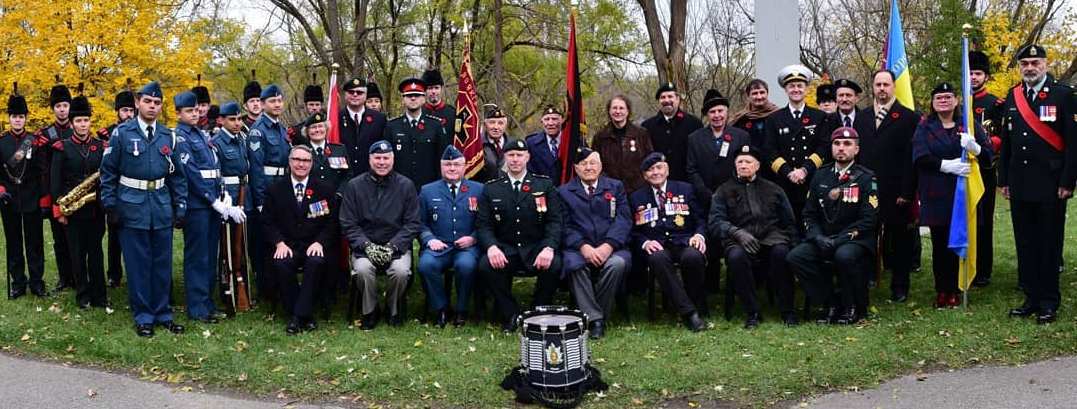
Photo from November 4, 2018 Remembrance Day ceremony at the Ukranian
Memorial, posted to the facebook page of the Queen's Own Rifles.
This activity reaches far beyond the Toronto suburb. On June 18, 2018, Colonel Brian Irwin, Defence Attaché at the Canadian Embassy in Kyiv; Kareem Marcos, Deputy Canadian Ambassador to Ukraine; and Janur Peter, embassy staffer, participated in an extensive meeting with the neo-Nazi Azov Battalion in Mariupol to discuss military strategy and training. According to the Azov website, "At the end of the meeting, the Canadian representatives thanked Azov members for their attention and expressed their hopes for further fruitful cooperation." Also part of Colonel Irwin's meeting was "the head of the Military School of the commanders named after the colonel Yevhen Konovalets." Konovalet is one of the officer training academy's idols and his portrait frequently adorns its military iconography.
Azov Battalion, a unit of the Ukrainian National Guard, has been internationally condemned for war crimes and terrorism, most recently in an open letter by 40 members of the U.S. House of Representatives. The meeting was not reported by the media in Canada until September 2019.
On August 21, 2019, flanked by three officers from the Canadian training brigade code-named Operation Unifier, Canada's then-ambassador to Ukraine Roman Waschuk took part in a grotesque ceremony in the city of Sambir in Western Ukraine, unveiling a monument dedicated to executed members of World War II Nazi ally OUN and its military wing, the Ukrainian Insurgent Army (UPA). The monument is erected on the grounds of a broken-down Jewish cemetery, where more than 1,200 Jews were shot and dumped into mass graves in 1943 by the Nazis and their Ukrainian collaborators. The ceremony was condemned by the Ukrainian Jewish Committee. "It's a blatant insult to the memory of the Jewish victims," Eduard Dolinsky told Radio Canada International. "It's like erecting a monument to murderers on the graves of their victims."
Postmedia reported that "Global Affairs Canada said the Sambir event was intended to assist efforts by the Jewish community in Canada and Ukraine to build public support to create an eventual memorial for the Jewish cemetery in the town. That was the reason for Waschuk's attendance and to suggest otherwise would be false, the department said." This disdain for telling the truth is tantamount to saying "the Jews made us do it." The victimizers are equated with the victims, the fascists with the Jews, who must prostrate themselves in the name of "reconciliation" and "building public support."
In November, Canada once again cynically abstained on a UN resolution condemning the revival of Nazism, the glorification of Nazi criminals, their accomplices, and those who today fuel ethnic strife and xenophobia. In approval of the resolution, 121 countries voted "Yes," 55 countries abstained, and two countries (the U.S. and Ukraine) voted "No."
The political agenda of the ruling elite in Canada has always lumped the Soviet Union and communism in with Nazi Germany and nazi-fascism with the aim of supporting nazi-fascism and opposing communism. Prior to forging the alliance with the Soviet Union after the German occupation of France and attacks on Britain, Canada declared the Soviet Union an enemy when it was forced to sign the non-aggression pact with Germany in 1939, having been isolated and abandoned by the great European powers when they signed the Munich Agreement which permitted Hitler's attacks on Czechoslovakia and Poland and their subsequent expansion to all of Europe. But Canadian soldiers did not fight in World War II to support the fascist cause: they fought to defeat it. Their participation in commemorations such as the one which is organized every year in Etobicoke undermines their integrity and the honour of all Canadians who gave their lives in the anti-fascist war. It deserves a public outcry against it.
Note
1. A term that became infamous when the Nazis used it to describe non-Aryan "inferior people," often referred to as "the masses from the East," that is Jews, Roma, and Slavs -- mainly Poles, Serbs, and later also Russians.
(Sources: Michael Sayers & Albert E. Kahn, Sabotage! The Secret War Against America, Harper & Brothers, 1942, 1st edition; New Pathway; Radio Canada International, Postmedia, Ukrainian National Federation; Wasyl Vera, The Ukrainian Canadian Committee; Its Origin and War Activity, MA thesis University of Ottawa, 1967; Saul S. Friedman, Pogromchik: The Assassination of Simon Petlura, Hart Publishing, 1976)
Britain's Call for a General Election
Working People Give Voice to Their Own Agenda
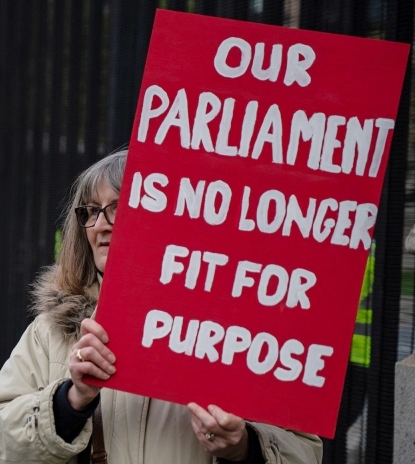 A general
election is to be held throughout the
state known
as the United Kingdom on Thursday, December 12. The writ was
dropped after the Early Parliamentary General Election Act
2019 was passed by the British House of Commons. The call to
hold a general election comes after a long list of failed
attempts to sort out the contradictions within the British ruling
class over the direction of the economy in Britain so as to best
benefit the demands of the financial oligarchy and the U.S.
striving for world domination and war preparations. They have
taken the form of whether to remain a member of the European
Union or not. Neither the Brexit referendum, nor the subsequent
general election called to get a solid majority behind the Brexit
talks, nor a string of failed votes in the House of Commons to get
approval for one deal after another, have sorted anything
out. On the contrary, the divisions within the government between the
factions called political parties, and within the
political parties themselves, are sharper than ever. Along with
this, the crisis of credibility and legitimacy in which the
so-called liberal democratic institutions are mired is deeper
than ever. This includes the form of government and the form of
decision-making. Confidence in the government, the parties which
form a cartel party system and the House of Commons are at an
all-time low and confidence that an election will sort the
problems out is also lacking.
A general
election is to be held throughout the
state known
as the United Kingdom on Thursday, December 12. The writ was
dropped after the Early Parliamentary General Election Act
2019 was passed by the British House of Commons. The call to
hold a general election comes after a long list of failed
attempts to sort out the contradictions within the British ruling
class over the direction of the economy in Britain so as to best
benefit the demands of the financial oligarchy and the U.S.
striving for world domination and war preparations. They have
taken the form of whether to remain a member of the European
Union or not. Neither the Brexit referendum, nor the subsequent
general election called to get a solid majority behind the Brexit
talks, nor a string of failed votes in the House of Commons to get
approval for one deal after another, have sorted anything
out. On the contrary, the divisions within the government between the
factions called political parties, and within the
political parties themselves, are sharper than ever. Along with
this, the crisis of credibility and legitimacy in which the
so-called liberal democratic institutions are mired is deeper
than ever. This includes the form of government and the form of
decision-making. Confidence in the government, the parties which
form a cartel party system and the House of Commons are at an
all-time low and confidence that an election will sort the
problems out is also lacking.
The Revolutionary Communist Party of Britain (Marxist-Leninist) (RCPB(M-L)) explains the matter as follows: "It is certain that the election will sort out nothing for the ruling elites, embroiled in their own civil war. The old parliamentary system and its electoral mechanisms have had their day. They no longer function in letting power flow from a party in office to the party in opposition which also represents the status quo. The powers-that-be can no longer look towards a champion who will provide a measure of stability."
The desire of Britain's working people is to have a labour party which is not part of the status quo. This requires blocking the factions within the Labour Party itself that support a neo-liberal agenda and status quo of power and privilege, which is what has caused havoc in the British economy in this period. By destroying the welfare state, the ruling class has privatized the systems of health care, education and civil services as well as transportation and turned other sectors of the economy over to war production and the oligopolies which are marauding all countries of the world.
RCPB(M-L) writes: "[T]he working class and people can make a difference by rejecting a vote for the establishment, at the very least preventing the Conservatives from forming a majority government, on their own or in alliance or coalition with any other party, and instead firmly voicing their own concerns and agenda, not relinquishing the struggle for their own rights and interests."
"The dysfunctionality of the old parliamentary system of 'representative democracy' has underlined that the people must use this election to speak in their own name, and in this sense empower themselves. That is, it is not only a people-powered campaign that is called for, but that the striving of the people themselves for their own empowerment is the call of the times."
RCPB(M-L) calls on the people to reject the pro-
or
anti-Brexit
agenda which the establishment wants to impose on the people. It
calls on them to take up the agenda of the concerns of the
people. "This election provides an opportunity for the working
class and people to speak in their own name. It provides the
opportunity to go all out for democratic renewal," the Party
says.
Using the Election for Discussing and Giving
Voice
to the
Concerns of the People
"The calling of a general election is a vain attempt to end the impasse in Parliament and sort out the contradictions in the ruling elite over Brexit. The election has not been called by the establishment in order to empower the people to decide the future direction of society, but to impose an agenda and try and justify business as usual with claims that the electorate have given the status quo a mandate. The working class and people will not accept this cynical state of affairs and are determined to go all out to pursue their own agenda," the Party writes.
"This election has been characterized by manoeuvring and shenanigans from the outset. Going into the election, the speculation is over alliances and backroom deals. This is now the usual feature of the crisis-ridden cartel-party system and the chronic inability to predict outcomes.
"After the interregnum of the May Government, which had attempted to represent stability through government by police powers, and was defeated in its attempt to win a majority on that basis, the rise of Boris Johnson has represented the end of a stable and functional state of affairs in British politics.
"Furthermore, the presentation of the issues is to deprive people of an outlook that clearly views the civil war between the ruling factions for what it is and instead sets its own agenda. Rather, the disinformation poses the people as categorized into opposing camps. There is a burning need to defend the unity of the people and reject this division.
"On the basis of this polarization of the polity, the narrative and presentation directs all attention to the leaders of the cartel parties and poses the issue as one of personalities.
"Manoeuvring, division, categorization over 'values,' and so on, aim to block the people from thinking for themselves and speaking in their own name, as do the constant polls and punditry. Reducing the matter to numbers and tactics serves to obscure the actual human relations that exist, and the actual issues in society that arise out of those relations.
"In these conditions and where people do not decide the electoral process, the candidates and their platforms, nor determine what are presented as the election issues, in spite of all the blocks and attempts to preserve the old arrangements, people need to create conditions for a new democratic personality to emerge.
"In this election, the times are calling for discussion to be organized, discussions characterized by everyone presenting their own thinking. Rather than succumb to the pressure to follow the traditional 'hustings,' or 'question time-style debate,' the division into candidate and elector can be ended by finding new forms in which all participants, whether 'panel' or 'floor,' are encouraged to speak about their experiences and present their views.
"RCPB(M-L) and its activists pledge to go all out
to do just
that in the coming days and weeks."
(Workers' Weekly No. 19, November 16, 2019. Photos: Workers' Weekly)
Vote No to War!
Stop the War urges all voters to consider the significance of this election for our foreign policy and the increasingly dangerous international situation.
The wars that recent British governments have participated in in Afghanistan, Iraq, Libya, Syria and elsewhere have killed and displaced millions, destabilized whole regions of the globe and wasted an unimaginable amount of resources.
Britain has long been the U.S.'s main supporter in the West. Recently our government has broadly backed Trump's confrontational stance over Iran. It has armed and given full political and military support to Saudi Arabia while it creates the world's worst humanitarian catastrophe in its war on Yemen. It has co-operated in ongoing operations in Syria and Iraq.
Meanwhile Britain has backed the U.S.'s increasingly aggressive stance towards Russia and China, raising the prospect of big power confrontation for the first time in generations.
The belligerent foreign policy that comes with the special relationship is making the world a more and more frightening and dangerous place. It has been one of the drivers of racism and Islamophobia and it has led to attacks on civil liberties at home.
Trump has already been welcomed twice to Britain by the Tories. Boris Johnson will be greeting him once again at the NATO summit in Britain on December 3. Stop the War will be protesting at the summit.
We urge people to use their vote to help break the cycle of violence and instability caused by the West's wars of the last two decades. A fundamental change of course is needed.
(Photo: J. Fenton)
Long Live Revolutionary Cuba
Resounding Rejection at the United Nations
of U.S. Blockade
of Cuba
For the 28th successive year, on November 7, 2019, the United Nations General Assembly resoundingly rejected the criminal U.S. blockade of revolutionary Cuba. The vote result was 187 nations for the resolution to reject the blockade and three against, with two abstentions. Only Israel and Brazil joined the U.S. in supporting the blockade. The resolution, titled Necessity of Ending the Economic, Commercial and Financial Embargo imposed by the United States of America against Cuba, explains the damages inflicted on the Cuban economy and people as a result of the U.S. economic war against Cuba, which continues unabated with the objective of negating and extinguishing Cuba's right to self-determination and independence. Moreover, Washington continues its ongoing campaign of subversion, and maintains the U.S naval base that sits on the illegally occupied Cuban territory of Guantánamo Bay.
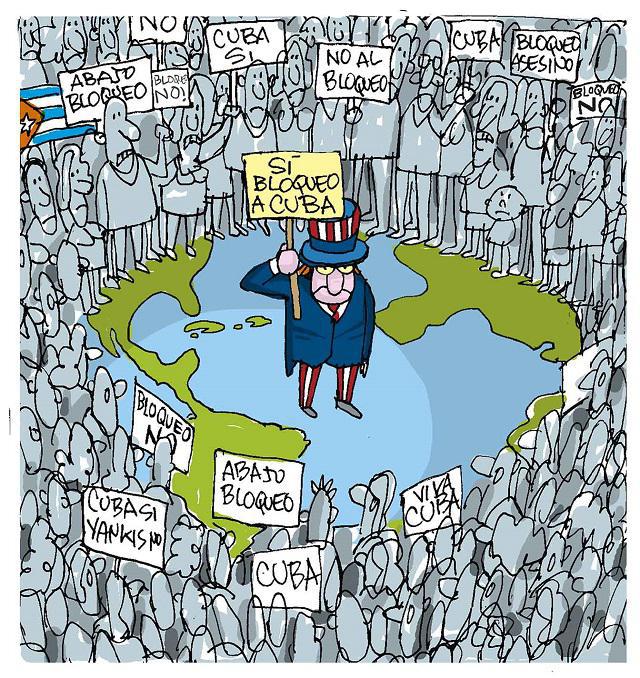 Every U.S.
government has pursued the illegal and immoral
attempt to strangle Cuba into submission. The administration of
U.S. President Donald Trump is finding new ways to escalate
hostility and aggression against Cuba on a daily basis. The
United States continues to zealously pursue and implement the
extensive series of economic sanctions, including the activation
of Title III of the Helms-Burton
Act, which allows U.S. companies
and citizens to sue, in U.S. courts, not only Cuban companies but
also companies engaged in business and other economic activity in
Cuba, no matter the country of origin.
Every U.S.
government has pursued the illegal and immoral
attempt to strangle Cuba into submission. The administration of
U.S. President Donald Trump is finding new ways to escalate
hostility and aggression against Cuba on a daily basis. The
United States continues to zealously pursue and implement the
extensive series of economic sanctions, including the activation
of Title III of the Helms-Burton
Act, which allows U.S. companies
and citizens to sue, in U.S. courts, not only Cuban companies but
also companies engaged in business and other economic activity in
Cuba, no matter the country of origin.
The response of the Cuban people is to strengthen their resistance and create evermore ways to overcome. The Cuban people are not surviving by adapting to the conditions the blockade has imposed on them. To the dismay of the Trump administration, the Cuban people are living life to the fullest under all conditions and circumstances, humanizing their social and natural environment and flourishing as a people despite the hostile acts committed against them.
On the occasion of the vote at the UN, the Canadian Network on Cuba pointed out: "The Cuban people can be confident that they can count on the ongoing undiminished support and friendship of Canadians. That support and friendship is rooted in the overwhelming respect of Canadians for Cuba's rights, independence and self-determination and a profound admiration for what the Cuban people have accomplished despite facing the unceasing aggression of the United States. This respect and admiration have forged unbreakable ties of friendship between the people of Canada and Cuba."
(Photos: Radio Havana, Martirena)
Celebration in Ottawa of
Cuban National Culture Day
On October 30, the Embassy of Cuba in Canada
invited Cuban
residents, representatives of the Canadian government, members of
the diplomatic corps and solidarity groups to a celebration of Cuban
National Culture Day, which this year was dedicated
especially to the 500th anniversary of the founding of the city
of Havana.
 At the gathering,
Professor Emeritus of the
University of
Toronto Keith Ellis was awarded the Haydée
Santamaría Medal by
the Councils of State of the Republic of Cuba, for his
outstanding contributions to Latin American and Caribbean
literature. Ellis is the author of numerous books and essays who
also has the great merit of having translated and made available
to the English-speaking public the work of the Cuban
National Poet Nicolás Guillén, and the Free
Verses of the National Hero of
Cuba, José Martí.
At the gathering,
Professor Emeritus of the
University of
Toronto Keith Ellis was awarded the Haydée
Santamaría Medal by
the Councils of State of the Republic of Cuba, for his
outstanding contributions to Latin American and Caribbean
literature. Ellis is the author of numerous books and essays who
also has the great merit of having translated and made available
to the English-speaking public the work of the Cuban
National Poet Nicolás Guillén, and the Free
Verses of the National Hero of
Cuba, José Martí.
In her words, the Ambassador of Cuba to Canada, Josefina Vidal, acknowledged the invaluable work of Professor Ellis and referred to the establishment of October 20 as Cuban National Culture Day and the 500th anniversary of Havana.
Those present had the opportunity to enjoy several musical pieces interpreted by the Cuban pianist Miguel de Armas and by the young violin student Amanda Moreno. They could appreciate the photo exhibition "Habaneros" of photographer John Pinel, who was present for the occasion. The exhibition "Havana" by Uruguayan photographers Albino Moldes and Marcelo Romano was on display as well.
(Photos: Minrex)
|
Brazil
Lula Out of Jail!
Lula is greeted at ABC Metalworkers Union rally in São Bernardo do Campo, November 9, 2019, the day after his release.
On Friday, November 8, Brazil's popular former president Luiz Inacio Lula da Silva was released from jail in Curitiba, in the southern state of Paraná, where he had been imprisoned and kept in solitary confinement for the past one year and seven months. His release followed a 6-5 decision by the Supreme Court the night before that a person can be imprisoned only after all appeals to higher courts have been exhausted. Lula is still in the process of appealing the conviction for which he was imprisoned upon losing his first appeal. No evidence has ever been produced by Lula's accusers to prove he committed any crime.
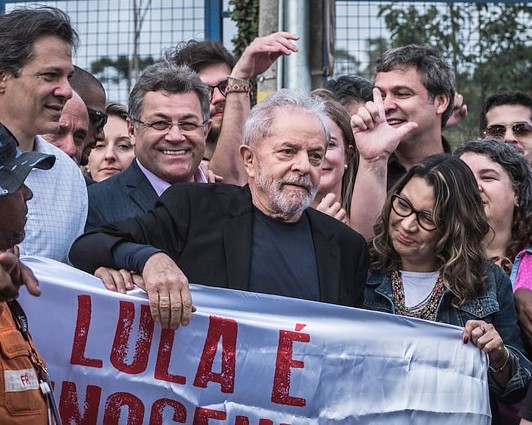 Meanwhile
damning evidence has come to light about the judge (now Brazilian
President Jair Bolsonaro's Minister of Justice and Public Security) and
the prosecutor colluding to ensure Lula was imprisoned to keep him from
running in, and likely winning, last year's presidential election as
the candidate of the Workers' Party.[1]
Meanwhile
damning evidence has come to light about the judge (now Brazilian
President Jair Bolsonaro's Minister of Justice and Public Security) and
the prosecutor colluding to ensure Lula was imprisoned to keep him from
running in, and likely winning, last year's presidential election as
the candidate of the Workers' Party.[1]
News of Lula's release was received with jubilation by his many comrades, friends and supporters. A throng of people waited excitedly at the gate of the prison to greet him as he walked out. When he appeared, with his fist raised in the air, Lula was greeted by the crowd, waving red Workers' Party flags and holding "Free Lula" banners. Lula walked straight to the Free Lula Vigil, a camp set up from day one outside the Federal Police Headquarters in Curitiba where he was incarcerated. There he delivered a speech thanking his defence team, his family and the many people and organizations that had supported him, mounted campaigns and fought tirelessly for his release.
"You have no idea how much it means for me to be here with you all," Lula told them. "I have spoken to the Brazilian people my entire life, and I never imagined that one day I would be here speaking to the men and women who shouted 'good morning, Lula,' ‘good afternoon, Lula,' 'good evening, Lula' for 580 days. It could be raining, or 40 degrees, or freezing. Every single day you were the living force of democracy that I needed to resist the rotten things they did to me and to Brazilian justice," he said. "I want the Public Ministry and Judge Sergio Moro to know that they did not imprison a man, they tried to kill an idea, but ideas don't die, they do not disappear."
Lula said he came out of prison feeling braver than ever and ready to fight for the Brazilian people and will not permit Bolsonaro to hand the country over to foreign powers.
On November 9, he travelled to his hometown of São Bernardo do Campo, a working class city close to São Paulo, where he took part in a rally in front of the ABC Metalworkers Union, which he led before becoming president and which has always been his base. He told the sea of supporters who came to celebrate his release that they were going to have to do a lot of fighting, that fighting is not something that is on one day then off for three months, then back on again; it is something that has to be done every day.
Lula's defence team said the legal battle continues, focused now on getting his convictions nullified.
Note
1. Six Holes in the Lawfare Conviction of Lula, Brien Mier, TML Weekly, February 9, 2019.
(Brasil de Fato, teleSUR, Brasil Wire, France24. Photos: Brasil de Fato, G. Mendez)
Bolivia
Denounce Foreign-Inspired Coup d'État in Bolivia
On November 10, after a series of brutal attacks by the
foreign-inspired opposition, Bolivian President Evo Morales and his
vice-president announced their resignation which hands over the reins
of government to the National Assembly. TML Weekly denounces the
serious acts of wanton violence, arson, hijacking and other activities
against ministers of the Evo Morales government, his family and the
families of government ministers, as well as leaders of the workers'
and
peasants' mass organizations. The entire coup is instigated by
the U.S., Canada and other countries which are committing the wanton
attacks on the democratic institutions in the name of democracy, human
rights and other treacherous claims. TML
Weekly denounces the utterly
racist stand of the government of Canada which claims to support
Indigenous rights but does everything to undermine the first Indigenous
president who has restored the dignity of the First Nations and all the
oppressed. It shows that these representatives of the
international
financial oligarchy and narrow private mining interests will not
tolerate people's empowerment and that their talk about rule of law and
defence of the democratic order is purely self serving and
counter-revolutionary.
Earlier in the day, President Evo Morales had announced that he would
call
a new presidential election after a night of vandalism and violence in
different parts of the country by right-wing opposition forces in what
the Bolivian government called a coup attempt.
The houses of two governors as well as of the minister of mining and President Morales' sister were burned down and people associated with the governing Movement Toward Socialism (MAS) party were physically attacked. Violent opposition protestors also took over two state media outlets and threatened their staff. The signal of Bolivia TV was taken off air for more than eight hours. Meanwhile, social movements and other supporters of President Morales, popularly known as Evo, took to the streets in different cities to defend the country's democratic processes and the constitution against the wrecking of the coup forces.
Speaking at a press conference in La Paz, Evo said he would also replace the country's Supreme Electoral Tribunal with a new one made up of members elected by the legislature. He called for calm and respect for private property, for authorities and between families, saying, "We all have the obligation to make Bolivia peaceful."
Standing beside Juan Carlos Guarachi, leader of the Bolivian Workers' Federation and Segundina Flores, executive secretary of the Bartolina Sisa National Federation of Campesino, Indigenous, and Native Women, Evo said his decision came after consulting with different social movements in the country.
His announcement followed the issue November 9 by the Organization of American States (OAS) of the report of its audit of the October 20 elections in which it recommended the holding a new election "as soon as conditions are in place to guarantee it being able to go ahead, including a newly composed electoral body."
Carlos Mesa, leader of the opposition Citizens' Community Party, who came second to Evo in the election and who declared even before the election that opposition forces would launch a coup if Evo won, said Evo and his running mate vice-president Alvaro García Linera, should not run in the new election.
Results of October 20 Election

Demonstrations in support of Evo Morales re-election, October 29, 2019
Bolivia's electoral law requires that a candidate receive 50 per cent of the votes plus one, or 40 per cent and a 10-point advantage over their nearest rival, to be declared the winner on the first round. Otherwise a second round is required. When the Supreme Electoral Tribunal reported the final results of the election, Evo was declared the winner with 47.07 per cent of the vote to Mesa's 36.51 per cent. In third place was Chi Hyun Chung of the Christian Democratic Party with 8.78 per cent.
Well before all the results had been received and tabulated however, the OAS election observer mission was questioning what it called "irregularities" in the vote count, without credible evidence to back up the allegation and ignoring known differences in voting trends and the speed with which results are typically transmitted from urban and more remote, rural parts of the country where support for Morales is traditionally strong.
Referring to this, Morales said in an interview October 24 that historically, in colonial times, Indigenous movements were threatened with extermination, and "[n]ow when the elections come again, they do not recognize the Indigenous movements just like in the past, so we see history repeating itself." He denounced that Mesa and other extreme right-wing politicians were instigating hatred, contempt and discrimination by presuming to disregard the rural vote and calling on the population to rise up against the results that favoured MAS. A native Aymara from Bolivia's highlands, Evo became the country' first Indigenous president in 2006 and handily won two more elections after that. His aim in running for a fourth term was to deepen the social and economic transformations achieved since he has been in office.
Before and after the results had been announced, opposition leader Carlos Mesa and other members of the Bolivian oligarchy and wealthy business people, most of them based in and around the Santa Cruz area, attempted to make good on their threatened coup. Following the model set by other foreign-backed coup forces in Venezuela and Nicaragua, they burned down seven regional elections offices, engaged in other acts of vandalism and violence around the country and called on the military and police forces to mutiny.
In an attempt to deflect the coup forces and avoid bloodshed, Evo and the MAS eventually agreed to the OAS doing a technical audit of the results and said they would abide by its recommendations, including if it called for a second round of voting based on its findings.
Canada's Interfering Role
Well before the OAS had performed its audit, on October 29, Canada cited the "serious irregularities" referred to in the hastily issued "preliminary conclusions" of the original OAS observer mission, which "found that the electoral process did not comply with international standards" and said there was serious doubt about the legitimacy of the results making it impossible to accept the outcome under the circumstances. It then joined the U.S. and a handful of other lackey "Lima Group" governments and the EU in illegitimately calling for a second round of elections -- despite Bolivian electoral authorities declaring Evo elected in keeping with the country's own electoral law -- thus providing support to the the head of the OAS elections interference mission, who had earlier declared that even if after 100 per cent of the votes were counted and the margin of difference exceeded the 10-point threshold "statistically," it was still advisable to convene a second round due to "the context and the problems evidenced in this electoral process."
In this way Canada, the self-proclaimed paragon of "democracy" and a "rules-based international order" is showing its hypocritical face once again, participating with the U.S. and other lackey governments in the Lima Group in the interfering activity of the OAS against independent-minded governments targeted for destabilization and regime change by U.S. imperialism.
In contrast, at a meeting of the OAS Permanent Council called October 24 to consider the situation in Bolivia, Mexico's representative Luz Elena Baños addressed the obvious lack of impartiality of the OAS electoral mission: "We demand respect for sovereign processes and condemn the fallacious claims of some member states of this organization that, despite [their countries] being under major social and political upheavals, want to be the judges and monitors of democracy in other countries of the region. We call for the sovereignty and institutionality of the Plurinational State [of Bolivia] to be respected and for the OAS not to insist on becoming an accrediting agency for political processes and governments." She added that it was Mexico's desire that the elections in Bolivia conclude in keeping with what their own laws dictate, without external interference.
(teleSUR, ABI, Orinoco Tribune, Al Jazeera. Photos: ABI, AVN)
Standing As One With the Chilean People
Militant Actions Support Chilean People and
Demand an End to
Brutal Repression
Montreal

Montreal, November 2, 2019
Montreal's Chilean community and its allies organized four actions over five days in support of the people of Chile against the untenable living and working conditions imposed upon them by the neo-liberal agenda of the Chilean ruling elite. Participants at the actions also condemned, and demanded an end to, the bloody violence being deployed by the Chilean state against a valiant people fighting for their rights and well-being. President Sebastián Piñera, a billionaire businessman and one of the richest men in Chile, is using the country's police and military forces to criminalize and repress opposition to his neo-liberal, anti-social measures.
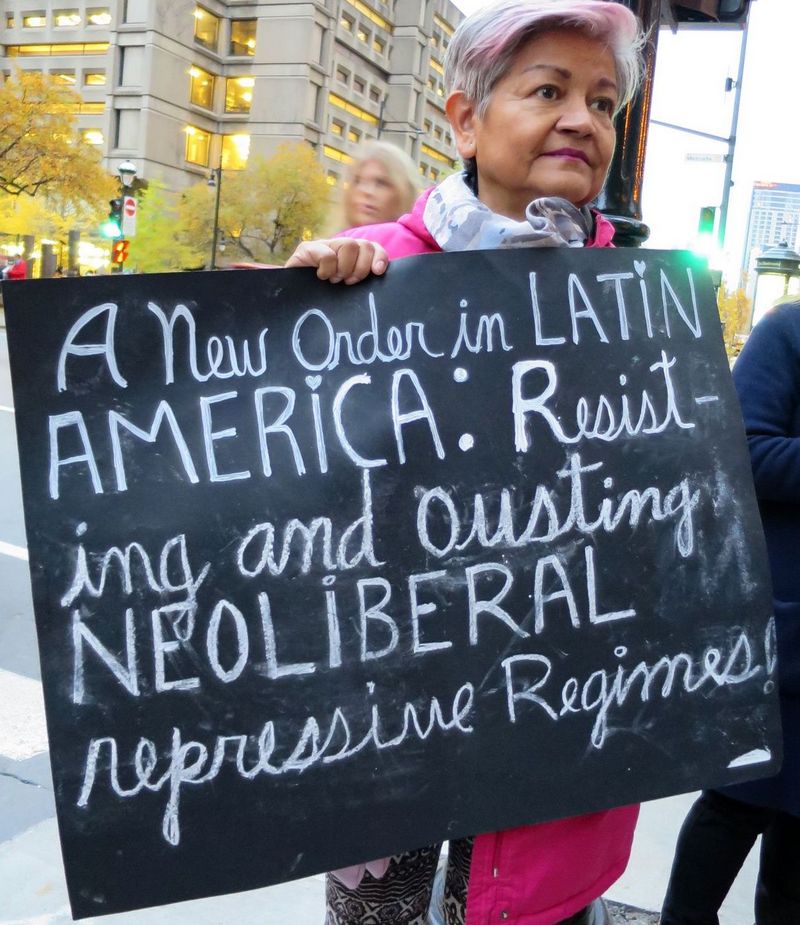 The
demonstrations took place in downtown Montreal outside the
Consulate General of Chile and on Saturday, November 2, at
Émilie-Gamelin Park, where close to 200 people of all ages
and
backgrounds gathered as one with the Chilean people and the
peoples of the Americas, who are demanding the recognition of
their rights and a pro-social direction for the economy
which they elaborate themselves. The many participants at the actions
declared
that never again will the Americas become the backyard of the
U.S. imperialists and of an oligarchy with only repression to offer to
preserve their power and privilege in the face of the people demanding
their fundamental rights.
The
demonstrations took place in downtown Montreal outside the
Consulate General of Chile and on Saturday, November 2, at
Émilie-Gamelin Park, where close to 200 people of all ages
and
backgrounds gathered as one with the Chilean people and the
peoples of the Americas, who are demanding the recognition of
their rights and a pro-social direction for the economy
which they elaborate themselves. The many participants at the actions
declared
that never again will the Americas become the backyard of the
U.S. imperialists and of an oligarchy with only repression to offer to
preserve their power and privilege in the face of the people demanding
their fundamental rights.
From 1:00 to 5:00 pm on November 2, songs of resistance, slogans and dancing enlivened the atmosphere around the demand that Piñera must be removed from office and a new constitution written, so that scores are settled with the dictatorship of the past. The crimes committed by the Piñera government against the Chilean people must not go unpunished, participants declared.
As of November 8, the Piñera
government's repression has
resulted in at least 23 deaths (with some sources reporting
dozens more), 1,659 persons injured and more than 7,000
detained, including 475 minors. As of November 6, Chile's
National Institute of Human Rights had commenced 181 legal
proceedings for homicide, torture and sexual violence committed
by the repressive forces of the state. The spirit embodied by
participants is the conviction that Chilean resistance and
solidarity between the peoples is what will bring an end to the
violence of the state against them.
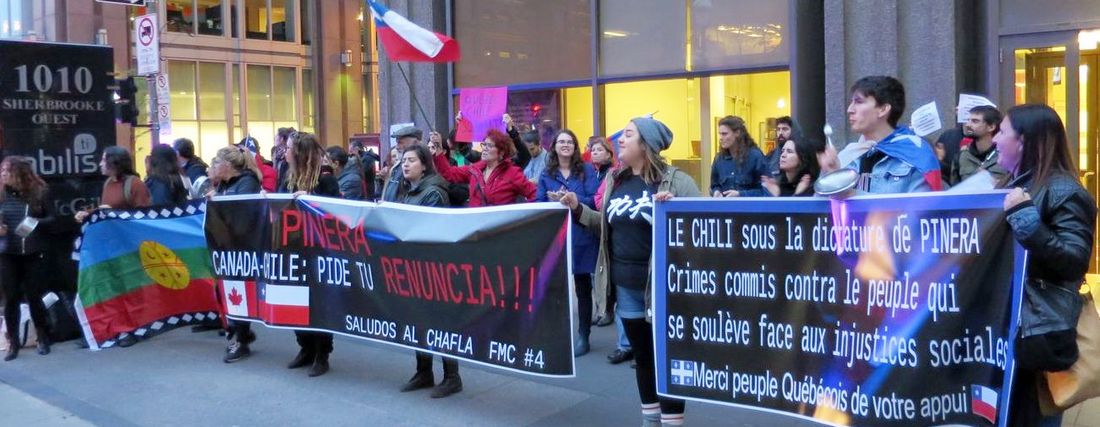
Montreal, October 30, 2019
The Trudeau government was directly called out for
its refusal
to condemn Piñera's repression. Participants highlighted the
fact
that on October 29, Prime Minister Trudeau issued a provocative press
release
where, in reference to Piñera, he said he "shared his
concern
about election irregularities in Bolivia" then "welcomed the
collaboration between Canada and Chile on a range of shared
priorities, including efforts to address the crisis in
Venezuela." This brings to the fore the fact that organized support
for the Chilean people and the other fighting peoples of the
Americas is intrinsically linked to the struggle here to condemn
liberal hypocrisy and warmongering against the peoples and the
need to make Canada a zone for peace. Many activists present
noted that the struggle of the Chilean people and of all the
peoples for their rights and dignity is one and the same struggle
and that it is the duty of one and all to step it up.
Calgary
In Calgary, over 200 people gathered in Olympic Plaza to show their support for the ongoing mass actions in Chile and to oppose police and military repression. The protest was lively and energetic with music and noisemakers from start to finish. Many people passing in vehicles honked their horns in support.
Windsor
A rally was held in Windsor on October 24 in
solidarity with the people in Chile fighting for their rights and
against brutal repression by state security forces. It took
place at the University of Windsor facing the entrance of the
Ambassador
Bridge to the USA, where participants banged on pots and pans and were
updated by speakers about recent events and the conditions of life in
Chile that sparked the people's uprising.
(Photos: TMLW)
Organizations
and
Individuals
Condemn
Piñera
Government's
Violence Against Chilean People
Collective Text of 40 Organizations

Montreal, November 6, 2019
We, the signatory organizations, hereby wish to express our profound indignation regarding the violent repression rampant in Chile, aimed at silencing the strong wave of social protest that has been shaking the country since last week. The declaration of a state of emergency, the imposition of a curfew and the massive deployment of military and police forces are trampling the fundamental rights of the Chilean people. The repression starkly recalls the methods of the nefarious Pinochet dictatorship.
Growing
popular
protest over the untenable living conditions
afflicting the country was the catalyst for the general civil
disobedience actions undertaken by high school students, who,
in a sign of protest against fare hikes decreed by the
Sebastián Piñera government, refused to pay the
metro fare. That
was the trigger for a vast, country-wide social mobilization. On
October 18, in the face of this eruption of protest and ensuing
mayhem, the government's response was forceful repression and the
imposition of martial law through the declaration of a state of
emergency and curfew. These measures were extended to the main
cities in Chile's five regions. The criminalization of protestors
and the militarization of law enforcement has had alarming
consequences. Based on data provided on October 21 by the
National Institute of Human Rights (NIHR), which has begun
instituting judicial proceedings as a means of condemning acts of
torture, conservative estimates are that 2,643 persons have been
detained, 15 have been killed, eight have been shot, hundreds have
been injured and four have been struck by vehicles belonging to the
forces of repression. [As of November 8, reports indicate that
as many as 23 people have been killed, 1,659 people injured and
more than 7,000 detained -- TMLW Ed.]
The vast majority of the Chilean people, through their social, trade union and student organizations, as well as health care and dock workers, teachers, retirees and artists, have clearly pointed to the urgency of finding solutions to the serious problems linked to the alarming deterioration of essential social services and the corruption of the political class and employers. Added to these demands is the denunciation of the privatization of waterways and lands, and the application of the anti-terrorist law against the Indigenous peoples who are defending their territories.
Within this context and in consideration of the extreme gravity of the situation and of its critical evolution, the signatory organizations support the demands of numerous international and Chilean organizations and declare the following:
- We accuse President Piñera of resorting to violent rhetoric and hate speech by stigmatizing social protest which he associates with delinquency;
- We reject the media embargo, disinformation and the manipulation of information that seeks to hide the actual scope of the social protest, its demands and the brutal repression afflicting the entire country;
- We categorically denounce the human rights violations of the police and military forces (illegal detentions, kidnappings, torture, assassinations and sexual attacks), which constitute a true declaration of war against the Chilean people;
- We reject the use of repression as a form of governance (violation of freedom of movement, of association and of expression) and a violation of the rule of law and demand the immediate withdrawal of military forces;
- We demand the restitution of democracy through the lifting of the state of emergency and the curfew, which are an attack on its very foundations;
- We urgently and strongly implore the Chilean government to listen to and find solutions to the social demands at the base of the present crisis.
For the list of signatories, click here.
(October 30, 2019. Translated from original French by TML. Photos: TMLW)
Artists for Peace
We are closely following the development of the people's revolt and the repression being exerted by the army and national police.
The violence being deployed against the population is of great concern to us and we want respect for the rights of the people and an end to the use of armed violence.
In support of your organizations, we demand a peaceful exit strategy for the crisis and democratic negotiations regarding the issues at stake within the Chilean society.
(October 25, 2019)
Statement Issued by Quebec City Area
Organizations and Individuals
Whereas, for over a week Chile has been the theatre of growing popular protests denouncing the cost of living and transportation.
Whereas, young high school students have collectively organized themselves to occupy the Santiago metro and no longer pay fares.
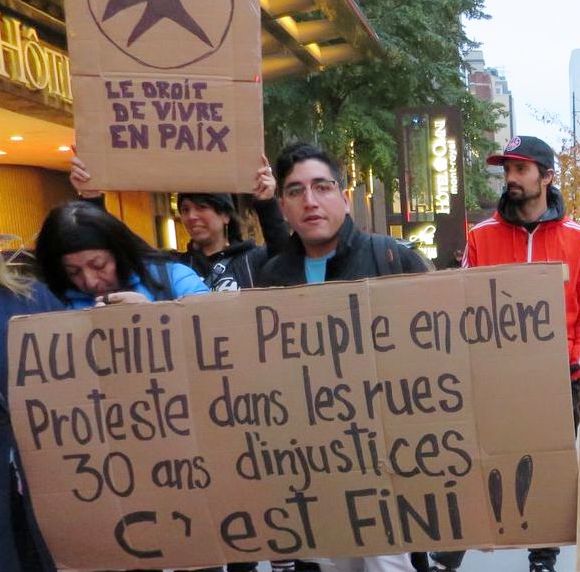 Whereas, the huge
concerts of pots and pans in working- and
middle-class neighbourhoods have begun to be heard nationally,
denouncing cuts to education and health care, miserly
pensions and the increasing transfer of public resources to the
large ever-wealthier consortiums.
Whereas, the huge
concerts of pots and pans in working- and
middle-class neighbourhoods have begun to be heard nationally,
denouncing cuts to education and health care, miserly
pensions and the increasing transfer of public resources to the
large ever-wealthier consortiums.
Whereas, while the Chilean people are thus expressing their discontent everywhere, the conservative and neo-liberal government of Sebastián Piñera has found no other solution than to opt for the criminalization and repression of these rallies and demonstrations.
He has declared a 15-day state of emergency for the metropolitan region of Santiago and numerous other large cities in Chile. He has decreed a 7 pm to 7 am curfew and sent the police and the army, now responsible for policing, into the streets, under the control of General Iturriaga del Campo, a man known for his harshness and fidelity towards the regime of General Pinochet. Suffice it for Chileans to recall the tragic memories of the 1973 military dictatorship. And exacerbate all the tensions and acts of desperation.
From Quebec, where we are following the events with concern (10,000 soldiers occupy Santiago, 42 people have died, 12 women have been raped by armed forces, 84 people have suffered bullet wounds and 1,465 people have been arrested), we denounce the silence or disinformation of a large part of the media.
We demand an immediate end to the state of emergency, we demand the withdrawal of the army from the public space and an end to police violence. We call for solidarity with the Chilean people.
For the list of signatories: www.pressegauche.org/Solidarite-avec-le-peuple-chilien-40897.
(October 22, 2019. Translated from original French by TMLW. Photo: TMLW)
World March of Women
The World March of Women salutes the rebellion of the Chilean youth who have offered an example of their courage since October 17. We stand in solidarity with the Chilean people, who, fed up with neo-liberal polices that infringe upon their rights, are joining the protests of the high school students.
 In solidarity, we
embrace all Chilean women participating,
along with their pots, in the demonstrations of discontent. In
doing so, they are clearly expressing their commitment to
life.
In solidarity, we
embrace all Chilean women participating,
along with their pots, in the demonstrations of discontent. In
doing so, they are clearly expressing their commitment to
life.
The Chilean people are experiencing a loss of their social, economic and cultural rights. Their rage was born from the increases in the price of water and its restricted access, the migration law, the approval of the [Trans-Pacific Partnership (TPP11)] and its repercussions on small producers through the pillage of their lands at the hands of extractivists, of the non-recognition of the right of women to decide what to do with their bodies and from the systemic violence against women, the Mapuche people, migrants, students and workers.
The protests and demonstrations are the overwhelming expression of the rejection by Chileans of the neo-liberal state, which imposes its democracy by way of harmonizing resources with the capitalist interests and their big public relations firms. People in the street have clearly made it known that they will not allow the capitalists to continue to transform their lives into a commodity, that they no longer want the state to subsidize the private sector and businesses at the price of precariousness in the life of women, of the working class, in education and in public health, to the detriment of life itself.
Through the World March of Women we have never been more involved in Chile. Our hearts go out, in particular, to the families grieving because of the excessive reaction of the government and of the police.
We firmly repudiate the Piñera government, which is resorting to Pinochet's tactics in its attempts to suppress the demonstrations.
We repudiate the criminalization and the trivialization of the demonstrations. We firmly reject the application of the law on the internal security of the state which constitutes a manifest infringement on the most fundamental of democratic rights and recalls the worst moments of the dictatorship. We demand the demilitarization of the streets and the recognition of the right to protest that belong to the people. We call on the members of the Chilean army to remind themselves that they are part of the people, that their families and their communities are in the street and that no order can be respected which violates their duty to protect the people.
Across America and worldwide, let's continue to march against neo-liberalism and authoritarianism until all are free.
We resist in order to live, we march in order to transform.
(October 28, 2019. Photo: TMLW)
213th Anniversary of the Assassination of Jean-Jacques Dessalines
Communiqué on the Situation in Haiti
|
|
Haiti commemorated, on October 17 of this year, the 213th anniversary of the assassination of Jean-Jacques Dessalines [the founder of the Haitian homeland], following almost two months of mass demonstrations by a large part of the population, which brought daily life in Port-au-Prince to a halt, amid strong repression by military forces.
The multiple protests began after the resurgence of the energy crisis that generated a shortage of fuel, resulting in a price increase nationally in a country where 70 per cent of the population lives in extreme poverty.
More than 77 people have been killed so far this year according to reports of human rights organizations, which highlight the murder of Haitian journalist Nehemie Joseph on October 10 in very murky circumstances. Several independent broadcasters have been closed amid complaints of pressure from the government and businesses linked to the energy sector.
In the context of this unrest, the new United Nations Mission, the so-called BINUH, came into effect on October 16. It replaces its predecessor MINUSTAH, continuing a policy of interference whenever the people's self-determination comes into play, in a clear intervention in Haiti's political life, without the full participation of all the social and political actors of the country.
The Latin American Council of Social Sciences (CLACSO) calls for the immediate cessation of repression of social movements, to respond effectively to the victims reported in recent months. It also calls for finding the most appropriate ways to resume the dialogue, in a process that takes into account the participation of all sectors of society and that has the Haitian people as the protagonists for social, political and economic change in Haiti, free of the control of bodies that hinder the exercise of their sovereignty.
Steering Committee of the Latin American Council of Social Sciences
The statement was approved by the CLACSO Steering Committee at its 100th Session in Havana, Cuba, October 23, 2019.
(Translated from original Spanish by TML. Photo: E. Dupain)
Honduras
Protest Reaches Boiling Point
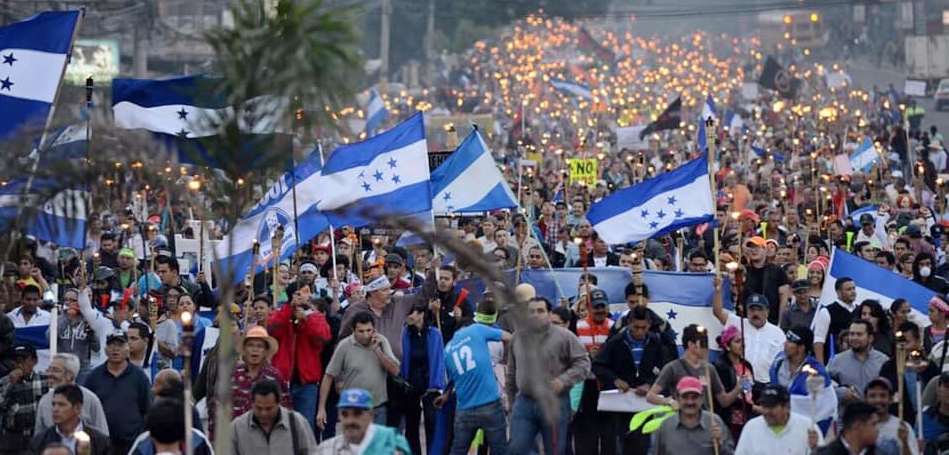
Mass protests, San Pedro Sula, Honduras, June 19, 2019.
Since the re-election of Honduran President Juan Orlando Hernández of the right-wing National Party in 2017, mass protests have been ongoing in the streets of Honduran cities. That election was considered fraudulent by many, but now a court decision in the United States has added to the anger against Hernández, a close ally of the Trump administration.
On October 18, a U.S. federal court in New York found the president's brother, Tony Hernández, guilty of major drug trafficking charges. And although Juan Orlando Hernández had previously stated that his brother alone was responsible for whatever he had done, the evidence presented against Tony also implicates Juan Orlando and his predecessor, former Honduran President Porfirio Lobo.
A major witness in the trial, gangster Devis Rivera Madriaga, testified that he had bribed both Presidents Hernández and Lobo to allow the Cachiros drug cartel a free hand to run drugs through Honduras on their way to sale in the United States. Furthermore, evidence was given that President Hernández's first election campaign, in 2013, had received support in the form of drug money.
The rise of Lobo and the Hernández brothers to power in Honduras was the result of the 2009 military coup d'état which overthrew left-leaning President Manuel Zelaya. At that time, the United States had maneuvered to prevent Zelaya from returning to power, and this resulted in the election of Lobo in November 2009, in circumstances in which the security forces were repressing the opposition, part of which boycotted the vote.
The Hernández regime has been exceptionally violent. The police have been militarized, protests have been repressed, and there have been murders of grassroots opposition figures, including the well-known Indigenous environmental defender Berta Cáceres, who was shot to death in March 2016, clearly because of her activism in opposition to an environmentally destructive dam project.
Poor Honduran rural and urban people have borne the brunt of the repression, as rapacious big business interests have worked with the security forces to repress their efforts to defend their livelihoods. For example, in Lower Aguan, there have been numerous deaths of farmers resisting encroachments of landowners who want to expand the cultivation of African palm for the international biofuels market. On the Caribbean coast, the Afro-Indigenous Garífuna population is under great pressure from powerful interests that want to push it out to make room for lucrative tourist operations. Labour, women's, youth, and LGBTQ activists face violent repression.
So it was no surprise that on Friday, October 18, after the conviction of Tony Hernández and in the context of the revelations about his brother the president, Hondurans hit the streets in more demonstrations. Ex-President Zelaya, who now leads the LIBRE left-wing political party, joined demonstrators in the Honduran capital, Tegucigalpa. On Monday, October 21, more demonstrations took place in the capital and elsewhere, with barricades and burning tires in the streets. They were violently repressed by security forces. Clouds of tear gas fired by the police filled the campus of the Francisco Morazán Pedagogical University, near the site of one of the major protests in the capital.
The long series of demonstrations and clashes with the security forces have resulted in deaths and injuries, and numerous Hondurans are in jail for their active opposition to the corrupt Hernández regime. Although right now the central demand of the demonstrators, and a broad sector of the opposition, is that Juan Orlando Hernández resign or be removed from the presidency, long struggles are also ahead to repair the damage done to this extremely poor nation of 9.3 million people since the 2009 coup.
Up until recently, the Trump administration has staunchly supported the sleazy and violent regime in Tegucigalpa. That the government of Juan Orlando Hernández was fraudulently elected, corrupt, and undemocratic did not faze Mr. Trump and his minions, any more than the narcotics involvement did. However, earlier this year, aid to Honduras was cut back as part of Trump's hysterical anti-immigrant frenzy. Trump and his people don't mind that the Hernández government robs and represses workers and poor farmers; it only bothers them that when the victims of this violence try to escape it, they [go] to the United States.
Ironically, for several years, many people in Congress have been trying to put a stop to U.S. financial support for repression in Honduras. Currently, there is a bill in Congress that aims at this: the Berta Caceres Human Rights in Honduras Act, H.R. 1945. The chief sponsor is Rep. Hank Johnson, D-Ga., and it has 73 co-sponsors to date, all Democrats. It would end almost all U.S. financial support for the Honduran security forces. But for this legislation to advance, people concerned about the Honduras situation will have to get cracking to ask their Congressional representatives to add their names to it.
Human rights organizations have been energetically pushing for pressure to support the Honduran people at this crucial moment. The Honduras Solidarity Network, with the support of the Alliance for Global Justice and others, points out that there are numerous people in Honduras already imprisoned or facing jail for their courageous protests against the illegal government of Juan Orlando Hernández. These organizations are asking that the U.S. public exert pressure immediately to force Honduran authorities to release all political prisoners.
Emile Schepers is a veteran civil and immigrant rights activist. Emile Schepers was born in South Africa and has a doctorate in cultural anthropology from Northwestern University. He has worked as a researcher and activist in urban, working-class communities in Chicago since 1966. He is active in the struggle for immigrant rights, in solidarity with the Cuban Revolution and a number of other issues. He now writes from Northern Virginia.
(peoplesworld.org, October 24, 2019. Photo: UNETV)
Anniversary of the Great October Revolution
Historic Parade in Moscow
Thousands of people participated in a symbolic parade to commemorate the 78th anniversary of the historic parade held in Moscow's Red Square on November 7, 1941 on the eve of the Battle of Moscow. That parade was organized by J.V. Stalin and the Communist Party of the Soviet Union on the anniversary of the Great October Socialist Revolution 24 years before.
In 1941, some 20,000 soldiers participated to remember that date in 1917 that changed the course of history. The soldiers departed directly from the parade for the battlefield.
The parade held in 1941, like the Great October
Revolution
itself, created hope and fueled the courage of the Soviet people
to win victory over the Nazi hordes that had invaded the Soviet
Union. Since current president Vladimir Putin has come to power, this
occasion
is marked to honour all those who gave their lives for the cause
of freedom in the Great Patriotic War and rally the Russian
people to make Russia Great Again. The 7,000 guests in the stands
this year included 1,200 veterans of the Great Patriotic War, one of
them
97 years old, news agencies report. Cadets of military institutes
of the army, aviation, navy, Interior ministries and Emergency
Situations participated.

Detail from painting by Konstantin Yuon of parade in Red Square,
November 7, 1941.
In addition, the future members of the Federal Security Service, the Ministry of Foreign Affairs, as well as circles of interest in military preparation and youth organizations marched through Red Square.
The parade also showed the legendary T-34 tank, armoured vehicles used in the Great Patriotic War, artillery pieces and heavy machine guns, which will now constitute an open-air museum.
The mayor of Moscow, Serguei Sabianin, spoke at
the
commemoration, declaring that from here in 1941, on the walls of
the very same Kremlin, the long road to victory began. In six
months, he said, we will celebrate the 75th anniversary of the victory
over fascism. In many Muscovite families the soldiers'
letters and the medals of those who fought are still preserved,
he said. We have an infinite debt to those who never returned
from the battlefield. They fought for the Fatherland, for our
future, he added. You gave us the inheritance of fighting until
the final victory, no matter how difficult it is. Our duty is to
continue the cause of the victors, create and build a great
nation, Sabianin said.
(Tass, Prensa Latina)
Workers the World Over Aspire to a New Society
Communist organizations in Russia were joined by representatives of political parties and democratic and progressive organizations from more than 80 countries at a march and rally in Moscow honouring the 100th anniversary of the Great October Socialist Revolution,
November 7, 2017. Celebrations took place in
countries
around the world.
November 7 marks the anniversary of the 1917 Great October Socialist Revolution in Russia. The first ever socialist workers' state was created and undertook the task to complete the democratic revolution that got underway in England in the 1660s. Old forms of governance based on liberal democracy and a bourgeois civil society were replaced with new ones, which created a socialist civil society with full employment, free education and health care, no taxes and equality before the law, full democracy to elect and be elected, no class privileges and no exploiting classes. It affirmed that peace, prosperity, freedom and fraternal unity of the peoples are not merely a utopia, a pipe-dream. They are attainable and the necessity of our times.
Today, the significance of the Great October Revolution to human history has actually increased as a result of the restoration of capitalism in the former Soviet Union, which led to it becoming an imperialist superpower and then to its collapse. The consequence is the brutal neo-liberal anti-social offensive and wars to achieve regime change and domination led by the U.S. imperialists, as they collude and contend with other great powers for domination over spheres of influence and sources of cheap resources, labour and zones for the export of capital with highest returns. In the conditions of the retreat of revolution, the world is now waking up to take stock of what it means to have a society such as the one which came into being just over one hundred years ago when Soviet Russia was established and Soviet power created a new society where the workers decided all matters in a manner which favoured their interests.
The conditions of the present are forcing all concerned to look at the most important events of the past with the eye of the present, to assist in securing the future. All over the world, the peoples are striving to bring new forms into being, based on democratic principles which vest sovereign decision-making power in the people in a manner which is consistent with the needs of the 21st century.
Not only did the October Revolution bring an
entirely
new
class to power -- the working class -- it also inspired the
workers and oppressed of all lands to embark on the same path.
The national crisis created out of the First World War was
resolved in favour of the people. It also ended this bloodiest
war in history which was being fought between the imperialist
powers for the re-division of the world. The Russian Revolution
brought to power those forces which lay latent in the bosom of
the old society. The workers, peasants and the intelligentsia and
other working people established a power which favoured them for
the first time in human history.
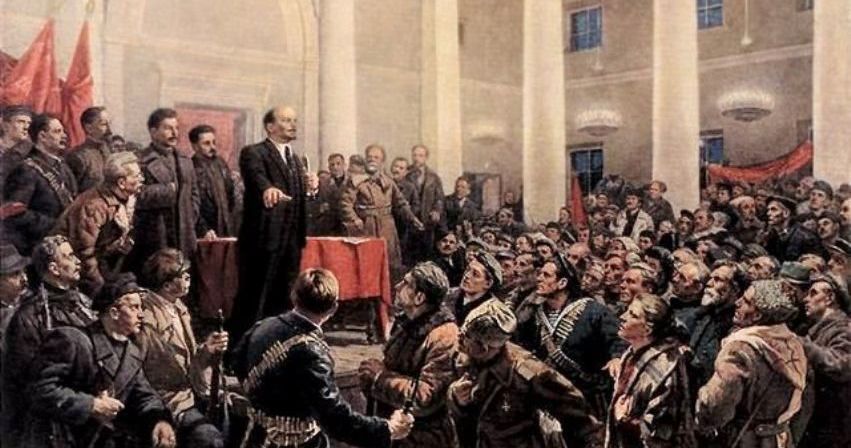
Lenin
declares Soviet power, October 26, 1917 at the historic
meeting of the Second All-Russia Congress of Soviets at
the Smolny Institute (painting
by D.
Nalbandyan).
This was the first revolution that created an entirely new society. Socialism appeared on the world historical scene, as predicted by Karl Marx, and the practice of the proletarian revolution ushered in an entirely new period, the period of ending the exploitation of persons by persons and of creating a socialist and communist society on the world scale.
The founder and leader of the Communist Party of Canada (Marxist-Leninist), Hardial Bains, emphasized that during the entire period which has followed the October Revolution, "people have been profoundly imbued with change. Everything points to a great upheaval in the making for the renewal of the society again at this time. Workers cannot but draw the conclusion that prejudices and dogmas are no substitute for a clear conscience and scientific analysis, on the basis of which the crisis in the sphere of ideas can be overcome and cognition can take place in favour of the people and that this is the necessary ideological preparation for renewal."[1]
"This period in history is increasingly bringing forth the necessity to look at all events in history with an open mind, by depending on the body of knowledge and experience of life itself to come to pertinent conclusions. A grasp of the present, a strong handle on what is going on in front of one's eyes, has become vital to ward off that blindness which presents events in history as the work of some evil forces, instead of recognizing them as important milestones on the high road of civilization," Hardial Bains added.[2]
The Communist Party of Canada (Marxist-Leninist) hails the Great October Revolution with a great deal of revolutionary optimism, by always keeping in mind that it is the working people who are to decide their future themselves. It is their stubborn persistence for renewal of the world today which reinforces the Party's resolve to continue until final victory.
 The
world is in transition
from one system to another. The
workers of the world and progressive peoples are striving to
bring a new world into being. They are taking stock of the
present situation in which democratic renewal has emerged as the
most important demand in order to humanize the social and natural
environment. What people are demanding is to take control of
their lives, their decision-making, their political power. The
working class is the most important part of this struggle for
renewal in which abolishing class privileges and discrimination
based on race, culture, nationality, religion, gender, language
and privileges has become the battle cry. The content, the words,
the analysis and observations, and the demands which the working
people are putting forward far exceed the possibilities that the
existing forms can provide. As a result, they are calling for a
change in the forms to ensure that they can bring about the
necessary changes for the resolution of the conflict in their
favour. Increasingly, the political processes are coming under
fire and the politicians have to resort to even greater deception
and anti-people, anti-social laws.
The
world is in transition
from one system to another. The
workers of the world and progressive peoples are striving to
bring a new world into being. They are taking stock of the
present situation in which democratic renewal has emerged as the
most important demand in order to humanize the social and natural
environment. What people are demanding is to take control of
their lives, their decision-making, their political power. The
working class is the most important part of this struggle for
renewal in which abolishing class privileges and discrimination
based on race, culture, nationality, religion, gender, language
and privileges has become the battle cry. The content, the words,
the analysis and observations, and the demands which the working
people are putting forward far exceed the possibilities that the
existing forms can provide. As a result, they are calling for a
change in the forms to ensure that they can bring about the
necessary changes for the resolution of the conflict in their
favour. Increasingly, the political processes are coming under
fire and the politicians have to resort to even greater deception
and anti-people, anti-social laws.
The Communist Party of Canada (Marxist-Leninist), taking into consideration all the developments of the past more than 100 years since the triumph of the Great October Socialist Revolution, calls on the workers to stand steadfastly behind their cause. The experience of this entire period is very instructive. CPC(M-L) calls on the workers to join with the Party to leave behind everything which has been negative, especially the influence of the bourgeois world outlook, in favour of elaborating their own reference points that help them make heads and tails of unfolding events, and work out what can be done to turn things around in their favour.
It Can Be Done! It Must Be Done!
Note
1. TML Daily, Vol. 22, No. 27, November 7, 1992.
2. TML Weekly, Vol 48 No. 38, November 3, 2018
(Photos: TMLW, TeleSUR)
(To access articles individually click on the black headline.)
Website: www.cpcml.ca Email: editor@cpcml.ca
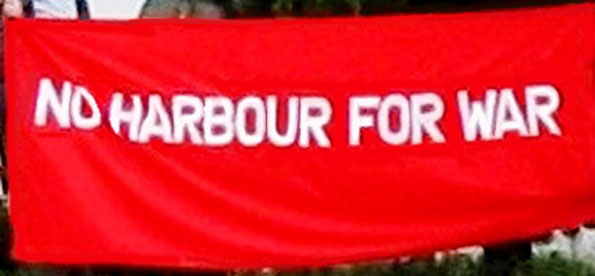

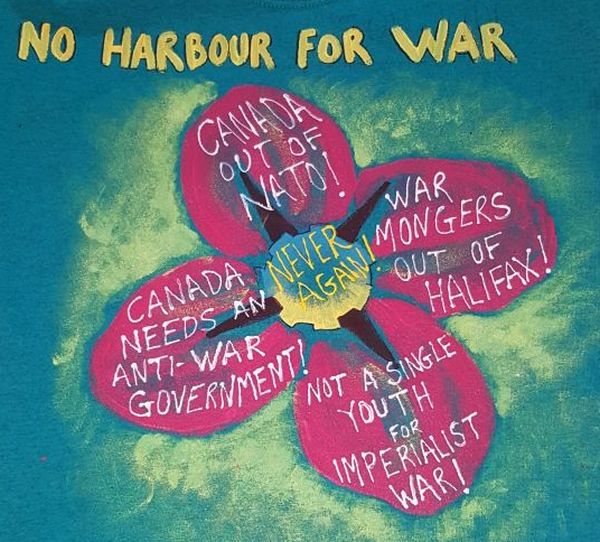 The HISF is
anathema to Haligonians who have long declared that their city is "No
Harbour for War!" and should not provide a venue for warmongers and war
criminals, and their handmaidens, to plan further aggression against
the peoples of the world. Nor do they accept that the Canadian
government should be funding this U.S.-based organization with tens of
millions of dollars.
The HISF is
anathema to Haligonians who have long declared that their city is "No
Harbour for War!" and should not provide a venue for warmongers and war
criminals, and their handmaidens, to plan further aggression against
the peoples of the world. Nor do they accept that the Canadian
government should be funding this U.S.-based organization with tens of
millions of dollars.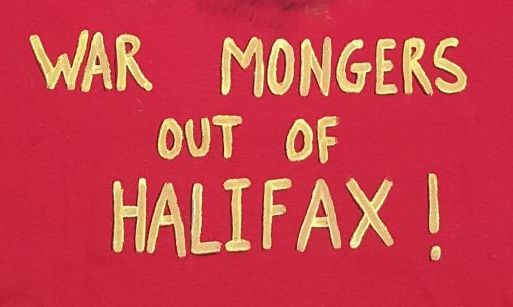 TML
Weekly calls on everyone to go all out to take part
in the rally against the HISF at 1:00 pm on November 23, and other
activities, and stake their claim on Halifax and Canada as a Zone
for Peace. Besides the rally, there will be a panel discussion at
6:30 pm on November 23 at the Dalhousie University Student Union
Building, concerning the HISF and Obama's visit to Halifax on
November 13. This panel will include Margaret Kimberly, Senior
Editor of Black Agenda Report. This is an important
opportunity for everyone to speak in their own name against war
preparations and any role for Canada in aggression and war.
TML
Weekly calls on everyone to go all out to take part
in the rally against the HISF at 1:00 pm on November 23, and other
activities, and stake their claim on Halifax and Canada as a Zone
for Peace. Besides the rally, there will be a panel discussion at
6:30 pm on November 23 at the Dalhousie University Student Union
Building, concerning the HISF and Obama's visit to Halifax on
November 13. This panel will include Margaret Kimberly, Senior
Editor of Black Agenda Report. This is an important
opportunity for everyone to speak in their own name against war
preparations and any role for Canada in aggression and war.
 World War I was
an inter-imperialist war, a war
in
which working men were sent to be slaughtered as empires clashed
to re-divide the world. World War I left nine million
soldiers dead and 21 million wounded. In addition, at least five
million civilians died from disease, starvation, or exposure.
World War I was
an inter-imperialist war, a war
in
which working men were sent to be slaughtered as empires clashed
to re-divide the world. World War I left nine million
soldiers dead and 21 million wounded. In addition, at least five
million civilians died from disease, starvation, or exposure.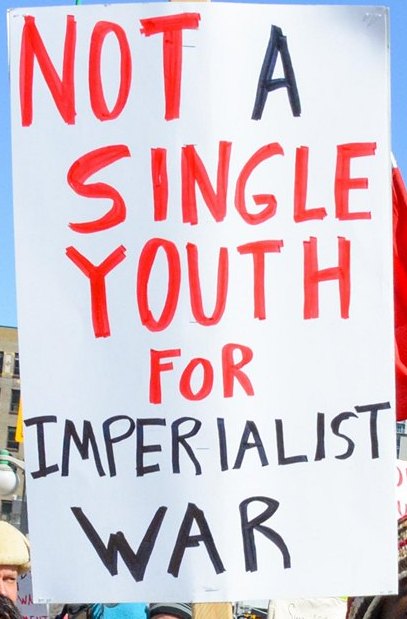 Today,
Canada's warmongering is presented as a foundational Canadian value.
But the sacrifice of Canadians contradicts official accounts. Their
sacrifice was made not for freedom but on behalf of empire. Canada's
independence was not secured by sending Canada's youth to participate
in the charnel house of imperialist slaughter that was World War I, a
war of division between the empires of the day to secure sources of raw
materials, cheap labour, zones for the export of capital and strategic
influence. On the contrary, Canada's ruling elite secured a place for
itself as a yes-man of first the British and then the U.S.
imperialists, while the movement of the people persists for a genuine
nation-building project in which the natural and human resources and
decision-making power serve the people, not the rich.
Today,
Canada's warmongering is presented as a foundational Canadian value.
But the sacrifice of Canadians contradicts official accounts. Their
sacrifice was made not for freedom but on behalf of empire. Canada's
independence was not secured by sending Canada's youth to participate
in the charnel house of imperialist slaughter that was World War I, a
war of division between the empires of the day to secure sources of raw
materials, cheap labour, zones for the export of capital and strategic
influence. On the contrary, Canada's ruling elite secured a place for
itself as a yes-man of first the British and then the U.S.
imperialists, while the movement of the people persists for a genuine
nation-building project in which the natural and human resources and
decision-making power serve the people, not the rich.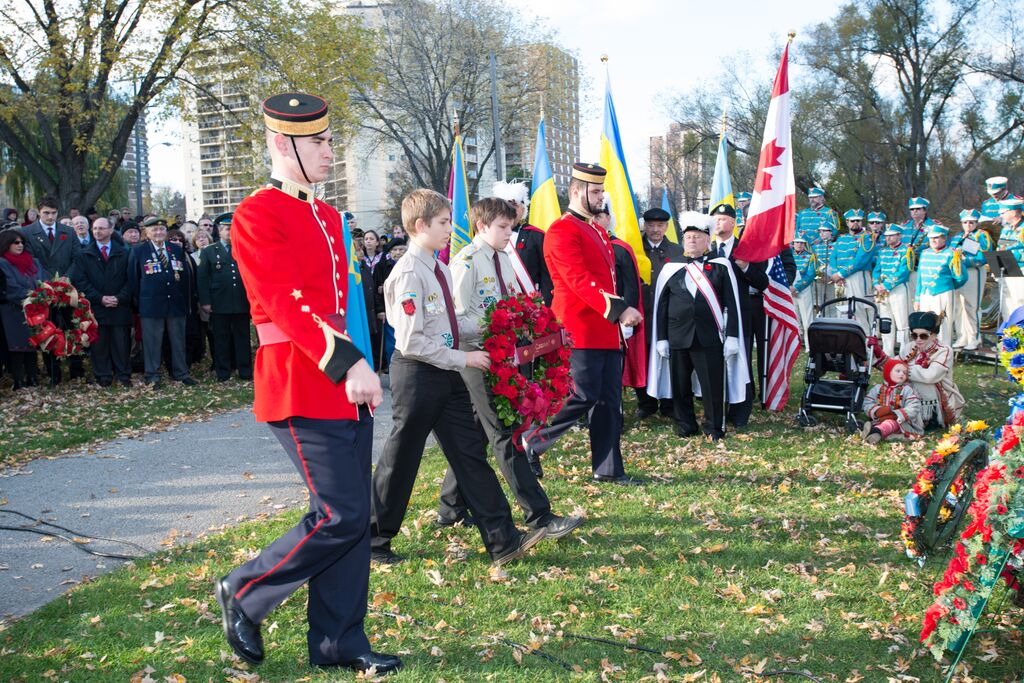

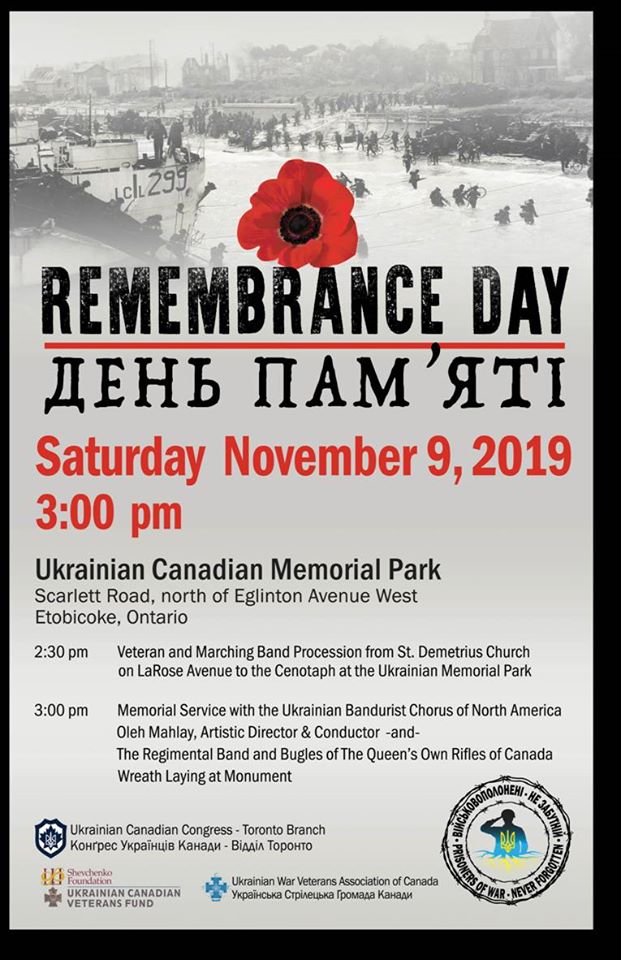 Although
Remembrance Day is a day during which Canadians
traditionally commemorate those who fought in the anti-fascist
war, which included a legion of Ukrainian Canadians, those being
honoured in Etobicoke include "veterans" that were Nazi
collaborators of Hitlerite Germany who voluntarily helped Nazi
Germany exterminate Ukrainian Jews, Poles, Roma and tens of
thousands of Ukrainians during World War II as part of ethnic
cleansing of the Untermenschen.[
Although
Remembrance Day is a day during which Canadians
traditionally commemorate those who fought in the anti-fascist
war, which included a legion of Ukrainian Canadians, those being
honoured in Etobicoke include "veterans" that were Nazi
collaborators of Hitlerite Germany who voluntarily helped Nazi
Germany exterminate Ukrainian Jews, Poles, Roma and tens of
thousands of Ukrainians during World War II as part of ethnic
cleansing of the Untermenschen.[